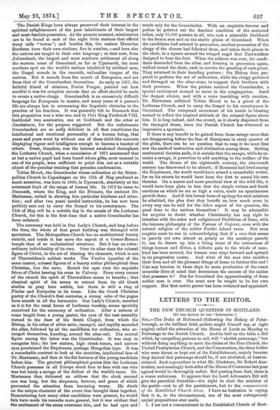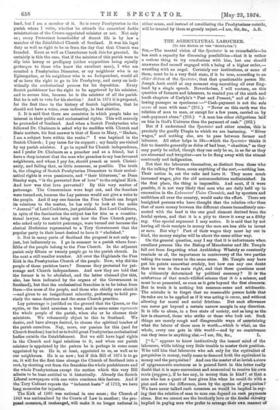LETTERS TO THE EDITOR.
THE NEW CHURCH QUESTION IN SCOTLAND.
[TO THE EDITOR. OF THE SPECTAT0R:]
Sia,—The Duke of Richmond (following the Bishop of Peter- borough, as the brilliant Irish prelate might himself say, at right angles) called the attention of the House of Lords on Monday to Patronage in the Scotch Church. And he laid on the table a Bill which, by compelling patrons to sell, will "abolish patronage," but without doing anything to meet the claims of the Free Church, the United Presbyterian Church, and the Cameroniana, the three bodies who were thrust or kept out of the Establishment, mainly because they desired that patronage should be, if not abolished, at least re- stricted. Such a procedure is what Mr. Gladstone, Sir Robert Ans- truther, and seemingly both aides of the House of Commons last year agreed would be thoroughly unfair. But passing from that, there is a worse unfairness. It appears that the Lord Advocate's Bill will give the parochial franchise—the right to elect the minister of the pariah—not to all the parishioners, bat to the communicants of the Established Church alone. I have no hesitation in saying that it is, in the circumstances, one of the most outrageously unjust propositions ever made.
1. I am not a communicant in the Established Church of Scot- land, but I am a member of it. So is every Presbyterian in the parish where I write, whether he attends the somewhat feeble ministrations of the Crown-appointed minister or not. Not only so ; every Protestant householder of decent life is by law a member of the Established Church of Scotland. It was his legal duty as well as right to be so from the day that that Church was founded. Knox as well as Claverhouse took this for granted. So certainly is this the case, that if the minister of this parish were to slip into heresy or profligacy (either supposition being equally grotesque to those who know the excellent man), I who am counted a Presbyterian Dissenter, or my neighbour who is an Episcopalian, or his neighbour who is an Independent, would all of us have the right to go to his Presbytery, and carry on indi-
vidually the ecclesiastical process for his deposition. Every Scotch parishioner has the right to be aggrieved by his minister, and to accuse him, because he is the minister of all the parish. But he is not to vote for his election ! And in 1874 it is proposed, for the first time in the history of Scotch legislation, that he should not have a voice, even indirectly, in that election.
2. It is said that there are countries in which people take no interest in their public and ecclesiastical rights. This will scarcely be pretended of Scotland. And when a Scotch Presbyterian who followed Dr. Chalmers is asked why he meddles with Church and State matters, his first answer is that of Knox to Mary, "Madam, I am a subject born within the realm !" I was baptised in the Scotch Church ; I pay taxes for its support ; my family are visited by my parish minister. I go in myself for Church independence, and I prefer Dr. Chalmers as a preacher and as a friend, but I have a deep interest that the man who preaches to my less favoured neighbours, and whom I pay for, should preach as much Christi- anity, and failing that, as little nonsense, as possible. The truth is, the clinging of Scotch Presbyterian Dissenters to their ecclesi- astical rights is even passionate, and "their bitterness," as Dean Stanley Bays, "is the perverted flow of love" to the original Kirk. And how was that love perverted? By this very matter of patronage. The Cameronians were kept out, and the Seceders were turned out, because the Lay patrons would not give a voice to the people. And if any one fancies the Free Church can forget its relations to the matter, he has only to look at the noble " Journal " of Lord Cockburn, just published. But Lord Cockburn, in spite of the fascination the subject has for him as a constitu- tional lawyer, does not bring out how the Free Church party, who asked only to restrict patronage, were turned out because the clerical Moderates represented to a Tory Government that the popular party in their heart desired to have it "abolished."
3. But in many parts of Scotland the proposal is not only un- just, but ludicrously so. I go in summer to a parish where four- fifths of the people belong to the Free Church. In the adjacent parish only fifteen or twenty people go to the parish church. In the next a still smaller number. All over the Highlands the Free Kirk is the Presbyterian Church of the people. Now, why did the people of these parishes leave ? Because they protested for pat- ronage and Church independence. And now they are told that the former is to be abolished, and the latter claimed (for this, also, has been indicated by the organs of the Government in Scotland), but that the ecclesiastical franchise is to be taken from them—the mass of the people, and those who chiefly care about it —and given to an insignificant minority, professing to hold pre- cisely the same doctrines and the same Church practice.
Lay patronage is justified on the ground that the Queen, or the squire, or the laird exercises a trust, and in some sense represents the whole people of the parish, when she or he chooses their ministers. We vehemently object to this in Scotland. We desire, and have always desired, to choose the spiritual teacher of the parish ourselves. Nay, more, our passion for this (and for Church freedom) has led us to build great Presbyterian ecclesiastical bodies outside the Establishment. But we still have legal rights in the Church and legal relations to it, and when our parish minister is appointed by the patron he is perhaps in some sense appointed by us. He is, at least, appointed to us, as well as to our neighbours. He is so now ; but if this Bill of 1874 is to go on, it will for the first time change the Church of Scotland into a sect, by shutting out from the franchise the whole parishioners and the whole Presbyterians except the section which this very Bill adman to be least entitled to it historically. Already the Scotch Liberal newspapers with one voice condemn this feature. And if the Tory Cabinet repeats the "indecent haste" of 1712, we have long memories for injustice.
The Kirk of 1560 was national in one sense ; the Church of 1843 was nationalised by the Courts of Law in another: the pro- posed measure, if unehanged, will make it no longer national in



































 Previous page
Previous page